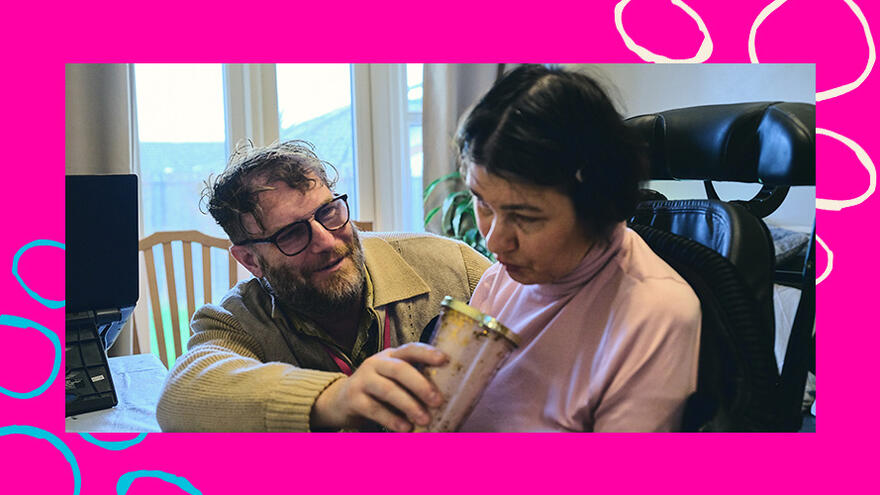Celebrating support workers and social care staff and highlighting their skills
140,000 people of working age with a
learning disability
 A learning disability is to do with the way someone's brain works. It makes it harder for someone to learn, understand or do things.
in England get social care support within the
community
A learning disability is to do with the way someone's brain works. It makes it harder for someone to learn, understand or do things.
in England get social care support within the
community
 A community is the people and places in an area.
to help them live their best lives.
A community is the people and places in an area.
to help them live their best lives.
Our Why We Care report, examines the
social care
 Social care means the services that give care and support to people who need it.
system in England and Wales through the experiences of those who work in it. It explores the challenges of the sector and celebrates the dedication of frontline staff supporting people with a learning disability, looking at what motivates them, what they do and the value they bring to people’s lives.
Social care means the services that give care and support to people who need it.
system in England and Wales through the experiences of those who work in it. It explores the challenges of the sector and celebrates the dedication of frontline staff supporting people with a learning disability, looking at what motivates them, what they do and the value they bring to people’s lives.

What social care workers do
Social care workers are professionals who work tirelessly to support people with a learning disability in every aspect of their lives. They help people manage their health, wellbeing,
finances
 Finances are anything to do with money.
and social life and many provide emotional support. Many social care workers are skilled in first aid, giving medicines, helping tube-feed people and dealing with challenging behaviours. And they do all this whilst working to strict regulations and complicated, legal guidelines.
Finances are anything to do with money.
and social life and many provide emotional support. Many social care workers are skilled in first aid, giving medicines, helping tube-feed people and dealing with challenging behaviours. And they do all this whilst working to strict regulations and complicated, legal guidelines.
Mencap staff told us in our Why We Care
survey
 A survey is when someone asks you to answer some questions.
that their job gives them a ‘sense of purpose’ and that they are motivated by seeing the people they support have a good quality of life, try new things and achieve their goals.
A survey is when someone asks you to answer some questions.
that their job gives them a ‘sense of purpose’ and that they are motivated by seeing the people they support have a good quality of life, try new things and achieve their goals.
Over the ten years I have worked in social care, I have supported some amazing, wonderful, people who have enhanced my life and opened my eyes to how the world should be for everyone. They have made me laugh and smile. No day is the same. It brings challenges, opportunities and adventures. I learn something new every day.”
Our Why We Care survey also told us:
- 34% of frontline workers said they did the role to give back to society or improve lives.
- 1 in 4 people said their work was 'rewarding'.

Join the Why We Care campaign
Show your support by joining our call for more funding and better pay for workers in social care.
Why We Care: What needs to change
Experts say that the government needs to invest £8.4 billion in 2024/25 to meet future demand, improve access to care and cover the full cost of social care.
We need government to take urgent action to ensure there are enough social care workers to support people with a learning disability and anyone else who needs it.
We have four recommendations on how government can do this:
Spotlighting support workers: Stories from the frontline of social care
Questions about Why We Care
Why is social care in crisis?
Social care is in crisis because there is a rising demand in the numbers of people needing social care due to an ageing population and increase in disability but government funding is not keeping pace with demand.
Social care workers need a breadth of skills and take on a huge responsibility but government underfunding means that providers can often only afford to pay staff around the minimum
wage
 A wage is the money you get for doing a paid job.
mark which is causing staff to leave the sector and making it hard to recruit new staff. Existing social care staff may then find themselves working longer hours to plug the gaps leading more people to leave for other jobs in sectors like retail or logistics.
A wage is the money you get for doing a paid job.
mark which is causing staff to leave the sector and making it hard to recruit new staff. Existing social care staff may then find themselves working longer hours to plug the gaps leading more people to leave for other jobs in sectors like retail or logistics.
What do support workers do?
Support workers do everything they can to help people with a learning disability to live happy, healthy and fulfilled lives. Some help people with a learning disability with personal care, but there are many other aspects to the role: helping people to find a job, managing their finances, helping them to get out into the community and socialise and supporting them with everyday tasks many of us take for granted such as taking public transport or going to a doctor’s appointment. Many are also skilled in medical tasks such as giving out medication or helping people to feed through a tube.
Why do people with learning disabilities need support workers? What kind of help might they need?
A learning disability affects the way someone’s brain works, making it harder to learn, understand or do things. Support workers can bring huge value to the lives of people with a learning disability and their families, helping them to make friends, get a job or
volunteer
 A volunteer is someone who helps out by doing work for free.
role or do the everyday tasks so they can live fulfilled lives.
A volunteer is someone who helps out by doing work for free.
role or do the everyday tasks so they can live fulfilled lives.
How many people with a learning disability get help from a support worker?
140,000 people of working age with a learning disability living in England get social care support within the community.
What value do support workers bring to people with a learning disability?
Support workers bring huge value to people with a learning disability, helping them to live fulfilled lives, whether that’s enabling them to pursue ambitions such as going to college, getting a job or setting up home or helping them with everyday tasks many people take for granted such as making a cup of tea, going shopping or meeting up with friends.
Why are people in social care leaving the sector?
Latest figures revealed that there are 152,000 vacant posts in social care, and a third of the workforce are leaving the sector completely.
Many are leaving the sector because they feel their pay is too low for their level of skill and responsibility especially as people working similar roles in the NHS can earn thousands more and with many struggling to get by on sector-wide low pay.
Our research shows two-fifths of frontline staff are struggling financially, with some having to work long hours to make ends meet or even having to cut back on basic necessities. With the sector struggling to recruit and retain staff it means remaining staff are working long hours to plug the gap of there not being enough staff, which affects their work/life balance and can lead to more people to leave the sector.
What needs to change?
All political parties must commit to devising and investing in a Long-Term Plan to retain those currently working in social care and attract new staff. This means increasing pay, ensuring it mirrors roles with similar duties in the NHS and putting in place a framework so people can progress in their career.
Why don’t people just leave if they don’t like the job?
Frontline workers are the beating heart of social care – without them many people with a learning disability would lack the support they need to live fulfilled lives, making friends, being part of the community and doing everyday tasks many of us take for granted. Dedication, passion, a desire to give back to society and enjoyment of the job means that many are staying in their roles in spite of sector-wide low pay. But people doing such a crucial role should get the recognition they deserve which is why we have launched our Why We Care
campaign
 A campaign is when people work together to try to change something.
.
A campaign is when people work together to try to change something.
.
How was the research conducted?
We surveyed 366 frontline staff supporting people with a learning disability including Mencap support workers, assistant service managers and service managers between 6 July and 27 July 2023 via an online survey, a printed survey with a Freepost address, voicemail and email.












